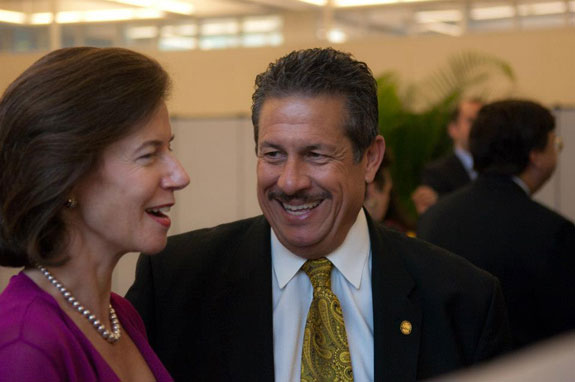
Miami-Dade Commissioner Jose “Pepe” Diaz has not disclosed the name of the company approved to receive a $3.5 million incentive for a secret project. (Photo courtesy of Jose Diaz.)
By Steve Miller
Florida Center for Investigative Reporting
In researching our recent story on businesses that are receiving both subsidies and government contracts, we found that the hoopla surrounding a taxpayer-backed project often left out a key part that made it happen — the subsidy.
For the story, we relied on a database put together by the folks at Good Jobs First, a Washington, D.C.-based nonprofit. Now, the same group has issued its first “Show Us the Local Subsidies” report, a handy guide to how municipalities around the country fare in terms of incentive disclosure online.
From the report:
Despite taxpayers’ indisputable interest in the investments made in private companies through economic development subsidies, over half of the local governments we evaluated in this study still fail to even name recipient companies online.
Among them: Duval and Miami-Dade counties, the latter of which is singled out for its poor disclosure.
In an example of disclosure-done-wrong, Miami-Dade County actually uploads County Commission Resolutions containing very specific business subsidy information to its legislative file database. However, the county (and many localities in the state of Florida) does not disclose the recipient company’s name in many cases, instead using code name monikers such as “Confidential Project Vision.”
Which turns out to be an amazing bit of subterfuge.
This is what the report talks about in Miami-Dade — a $3.5 million incentive for “confidential project vision,” approved by the board of county commissioners in July 2012.
The prime sponsor was Miami-Dade Commissioner Jose “Pepe” Diaz and was described in board documents as simply a “resolution approving confidential project vision as a targeted jobs incentive fund program business.”
We are told on these documents only that it involves a broadcasting company that already exists in Diaz’ s district, the company’s application was submitted by the Beacon Council, a tax-exempt economic development group, and that the company “is also considering Houston, TX; Los Angeles, CA; and New York, NY as alternative locations.”
The secret company was approved for $500,000 a year in breaks for seven years in a unanimous vote.
Two weeks ago, Miami-Dade commissioners approved $42,000 in tax refunds for another secret company. The vote was also unanimous, although Diaz, who was again the sponsor, was absent and did not vote.
This secret company is “seeking to establish a regional shared service center to support their Latin American operations in over 10 countries” that will include “accounts payable, accounts receivable, payments, collections, cash management, account reconciliations, fixed assets and general ledger accounting.”
We sent an email to Commissioner Diaz, asking that he identify the beneficiary of last year’s break as well as the most recent. He has not yet responded.
